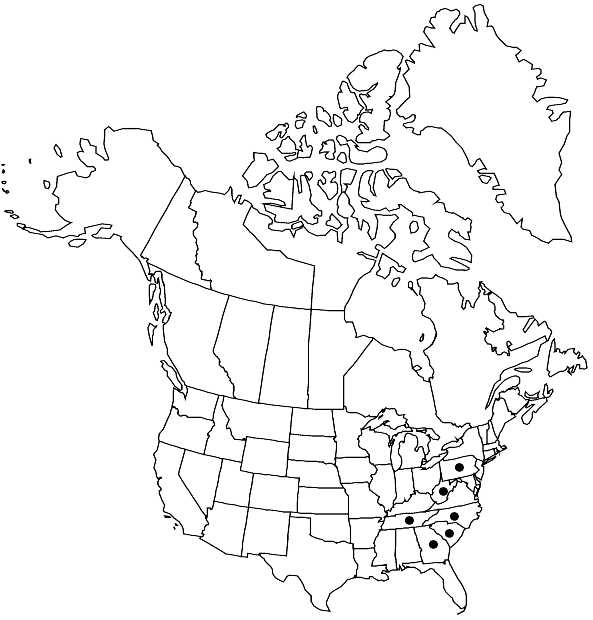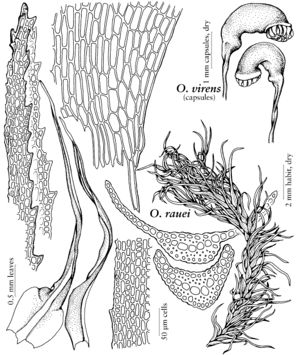Difference between revisions of "Oncophorus rauei"
Moss Fl. N. Amer. 1: 71. 1937,.
FNA>Volume Importer |
imported>Volume Importer |
||
| (6 intermediate revisions by 2 users not shown) | |||
| Line 6: | Line 6: | ||
|place=1: 71. 1937, | |place=1: 71. 1937, | ||
}} | }} | ||
| − | |basionyms={{Treatment/ID/ | + | |basionyms={{Treatment/ID/Basionym |
|name=Syrrhopodon rauei | |name=Syrrhopodon rauei | ||
|authority=Austin | |authority=Austin | ||
| + | |rank=species | ||
| + | |publication_title=Bull. Torrey Bot. Club | ||
| + | |publication_place=6: 74. 1876 | ||
}} | }} | ||
|synonyms= | |synonyms= | ||
| Line 24: | Line 27: | ||
|habitat=Moist acidic rocks or cliffs near streams or waterfalls | |habitat=Moist acidic rocks or cliffs near streams or waterfalls | ||
|distribution=Ga.;N.C.;Pa.;S.C.;Tenn.;W.Va. | |distribution=Ga.;N.C.;Pa.;S.C.;Tenn.;W.Va. | ||
| − | |discussion=<p>Oncophorus rauei, a rare species, has a south temperate distribution and is distinguished by its dark color and rocky habitat. Although O. virens is also saxicolous, that species is distinguished by its folded leaves, which have revolute margins, and are gradually subulate, wihtout a sheathing base. Onchophorus wahlenbergii is an epixylic species with leaves strongly contorted when dry, the lamina is only 2-stratose at the margins, and the seta is usually longer.</p> | + | |discussion=<p><i>Oncophorus rauei</i>, a rare species, has a south temperate distribution and is distinguished by its dark color and rocky habitat. Although <i>O. virens</i> is also saxicolous, that species is distinguished by its folded leaves, which have revolute margins, and are gradually subulate, wihtout a sheathing base. Onchophorus wahlenbergii is an epixylic species with leaves strongly contorted when dry, the lamina is only 2-stratose at the margins, and the seta is usually longer.</p> |
|tables= | |tables= | ||
|references= | |references= | ||
| Line 33: | Line 36: | ||
-->{{#Taxon: | -->{{#Taxon: | ||
name=Oncophorus rauei | name=Oncophorus rauei | ||
| − | |||
|authority=(Austin) Grout | |authority=(Austin) Grout | ||
|rank=species | |rank=species | ||
| Line 47: | Line 49: | ||
|publication year= | |publication year= | ||
|special status= | |special status= | ||
| − | |source xml=https:// | + | |source xml=https://bitbucket.org/aafc-mbb/fna-data-curation/src/2e0870ddd59836b60bcf96646a41e87ea5a5943a/coarse_grained_fna_xml/V27/V27_603.xml |
|genus=Oncophorus | |genus=Oncophorus | ||
|species=Oncophorus rauei | |species=Oncophorus rauei | ||
Latest revision as of 21:27, 5 November 2020
Plants in loose tufts or extensive mats, dark green to dark yellow-brown. Stems 1.5–3 cm. Branch leaves flexuose-spreading moist or dry, ovate-lanceolate, abruptly subulate from ovate base, finely serrate, 2.5–5 mm, subtubulose above, sheathing at base, margins plane; costa stout, mostly percurrent; laminal cells 2-stratose; distal laminal cells mostly subquadrate; basal laminal cells elongate, rectangular, incrassate, alar slightly differentiated. Seta 5–8 mm. Capsule yellow-brown, nearly smooth at maturity, 1–1.5 mm. Spores 16–19 µm.
Phenology: Capsules mature summer.
Habitat: Moist acidic rocks or cliffs near streams or waterfalls
Distribution

Ga., N.C., Pa., S.C., Tenn., W.Va.
Discussion
Oncophorus rauei, a rare species, has a south temperate distribution and is distinguished by its dark color and rocky habitat. Although O. virens is also saxicolous, that species is distinguished by its folded leaves, which have revolute margins, and are gradually subulate, wihtout a sheathing base. Onchophorus wahlenbergii is an epixylic species with leaves strongly contorted when dry, the lamina is only 2-stratose at the margins, and the seta is usually longer.
Selected References
None.
